

Take Charge of Your Professional Development. It's easy to get complacent about professional development when you're employed.

If you already have a job, why should you go above and beyond to improve your skills, especially if it's not required by your company? But making an effort to help yourself grow professionally will help you succeed, both in the short term and in the long term. Importance of Professional Development in the Workplace. This is an age of stiff and cut-throat competition.
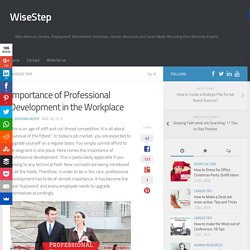
It is all about “Survival of the fittest”. In today’s job market, you are expected to upgrade yourself on a regular basis. 10 tips for dealing with change in the workplace. 10-megabyte hard disks...
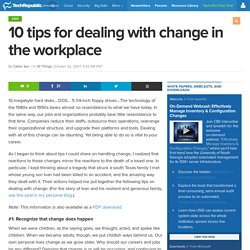
DOS... 5 1/4-inch floppy drives....The technology of the 1980s and 1990s bears almost no resemblance to what we have today. In the same way, our jobs and organizations probably bear little resemblance to that time. Companies reduce their staffs, outsource their operations, rearrange their organizational structure, and upgrade their platforms and tools. Dealing with all of this change can be daunting. Yet being able to do so is vital to your career. As I began to think about tips I could share on handling change, I realized that reactions to those changes mirror the reactions to the death of a loved one. Note: This information is also available as a PDF download. #1: Recognize that change does happen When we were children, as the saying goes, we thought, acted, and spoke like children. When I teach classes on customer service, I emphasize the importance of setting and managing the expectations of the customer. Effective Decision Making. Decision-making and problem-solving techniques, skills and methods.
Decision-making process Define and clarify the issue - does it warrant action?
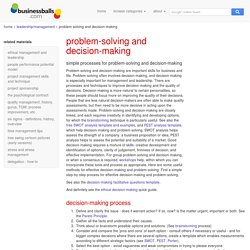
If so, now? Is the matter urgent, important or both. See the Pareto Principle. Gather all the facts and understand their causes. Decision-making maxims will help to reinforce the above decision-making process whether related to problem-solving or not, for example: "We know what happens to people who stay in the middle of the road. "In any moment of decision the best thing you can do is the right thing, the next best thing is the wrong thing, and the worst thing you can do is nothing. " Personal Goal Setting - How to Set SMART Goals - from MindTools.com. Planning to Live Your Life Your Way Learn how to set effective personal goals.
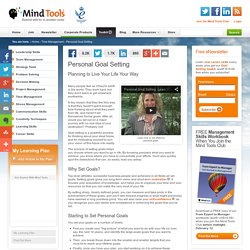
Many people feel as if they're adrift in the world. They work hard, but they don't seem to get anywhere worthwhile. A key reason that they feel this way is that they haven't spent enough time thinking about what they want from life, and haven't set themselves formal goals. After all, would you set out on a major journey with no real idea of your destination? Goal setting is a powerful process for thinking about your ideal future, and for motivating yourself to turn your vision of this future into reality. The process of setting goals helps you choose where you want to go in life. Why Set Goals? Building Trust Inside Your Team - Management Skills From MindTools.com.
Creating a Strong, Cohesive Group © iStockphotoBorisJovanovic19 A strong, cohesive team can achieve anything.

You may be deceived if you trust too much, but you will live in torment if you don't trust enough. – Frank Crane, American minister and author Have you ever managed people who didn't trust one another? Six Steps to Building Trust in the Workplace. By Pat Mayfield, for Yahoo!
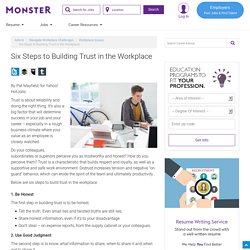
HotJobs Trust is about reliability and doing the right thing. It's also a big factor that will determine success in your job and your career -- especially in a rough business climate where your value as an employee is closely watched. Do your colleagues, subordinates or superiors perceive you as trustworthy and honest? How do you perceive them? Below are six steps to build trust in the workplace.1. The first step in building trust is to be honest. Tell the truth. Keeping your professional development continuous. Do you remember leaving school or university and thinking that exams and assessments would be a thing of the past?

It doesn't take long to realise that the workplace can be an equally intense and competitive learning environment. Whether we like it or not, employees are constantly being judged on their capabilities and benchmarked against their peers. And, unlike studying for a qualification, the goalposts in the workplace keep moving. This might be because of new technology, customer demand, legislation or simply because there is a new chief executive with a different vision. All these changes invariably have implications for the staff. Some organisations are good at providing learning opportunities when they can see a direct benefit to the organisation.
According to the 2012 Learning Survey by Niace, the adult learning organisation, there's a strong correlation between learning and sustained employment. Enhancing your performance Benchmarking the job market Knowledge updating. Change Management. Change management is basically the science, or possibly art, of managing yourself and others during a period of change.
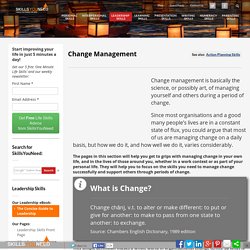
How to Demonstrate Respect at Work. Effective Decision Making.